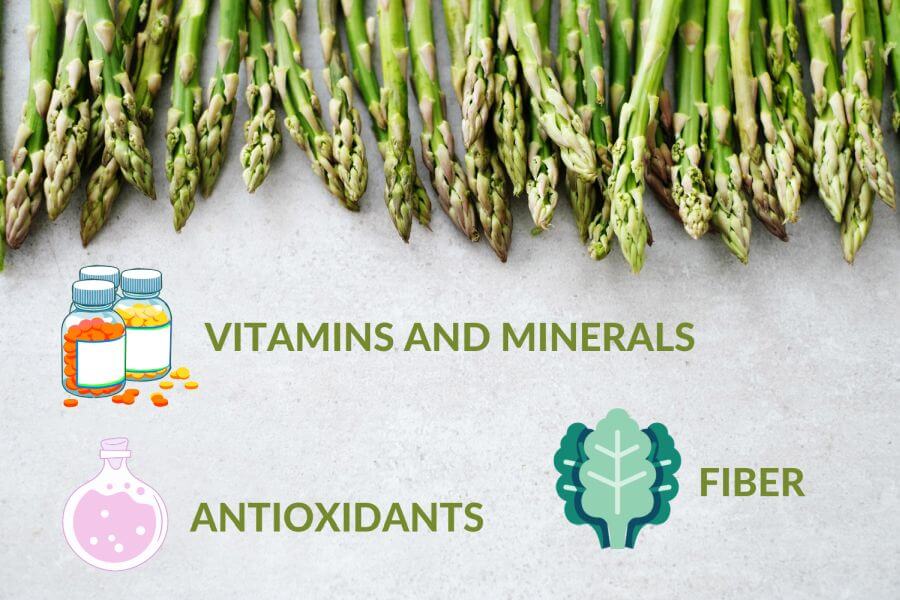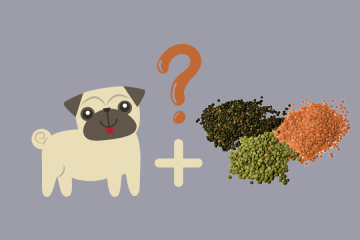Key Takeaways
- Asparagus is a healthy and nutritious veggie snack for dogs ✔️
- The small red “berries,” which the asparagus plant produces when it’s growing, contain sapogenin, which is toxic to humans and dogs ❌
- Raw asparagus can be hard for some dogs to digest – if your pooch has a sensitive stomach, do not give them uncooked asparagus ⚠️
- Feed asparagus in moderation and only occasionally, as too much can cause gastrointestinal upset ⚠️
Health Benefits of Asparagus for Dogs
It’s not a secret that asparagus is one of the healthiest foods on Earth. It provides essential vitamins and minerals that are beneficial for canines:
- vitamin K, which is essential for blood clotting and bone health in dogs;
- B vitamins, which help keep your dog’s skin healthy and promote a shiny coat of fur;
- vitamins A, C and E (in small amounts);
- potassium;
- phosphorus.
Asparagus is also a good source of antioxidants, which can help protect your dog’s cells from damage caused by free radicals (unstable molecules). Antioxidants are important for overall health and can help protect your dog against diseases like cancer. Additionally, asparagus can help reduce inflammation in the body, such as swelling caused by arthritis.

The stalks contain fiber, which can help with constipation and weight management in dogs. Fiber is also important for digestive health – it helps stool pass through your dog’s intestines more easily. This may help prevent certain types of cancer such as colon cancer from forming!
Did You Know…
Asparagus contains phytochemicals that may even act like natural antibiotics. It’s probably not enough to fight off an infection, but as part of a healthy diet, it can potentially strengthen your pup’s immunity.
Risks of Feeding Asparagus to Your Dog
There are a few risks associated with feeding your pup asparagus. Here are some of them.
- Although asparagus is not toxic for dogs, it can irritate a sensitive stomach. Some dogs may experience vomiting and diarrhea after eating asparagus.
- Raw tips and leaves might be hard to digest for your dog, or even worse – give him diarrhea! And don’t forget that the plant contains a lot of fiber, so if Fido gets too much, it’ll make him feel bloated and uncomfortable.
- Another risk of giving your dog asparagus is that all green vegetables contain oxalic acid, which can contribute to kidney stone formation. If your pup is healthy, they can eat asparagus without any problems. But if there’s been a history of kidney stones, it’s best not to take chances and keep him away from all greens.

If your dog experiences any adverse reactions after eating asparagus, consult with your veterinarian. It’s not toxic to dogs, but can be hard on their digestive system.
Can Dogs Eat Asparagus Fern?
Asparagus fern (Asparagus densiflorus or setaceus) is an ornamental plant that’s commonly grown in homes and gardens. It belongs to the same genus as the asparagus veggie (Asparagus officinalis). Can dogs eat it, too?
Unfortunately, this plant contains sapogenin, which is toxic to both dogs and cats. It can cause vomiting, diarrhea, abdominal pain, and skin rashes. So the answer to this question is a resounding no – asparagus ferns are not safe for dogs to eat!
Raw or Cooked? How to Prepare Asparagus for Your Pup
Now that we know that dogs can eat asparagus, the question remains how to prepare it so that your dog gets all the nutrients without experiencing any of the downsides. Don’t worry, we got your back! In general, cooked asparagus is preferable, and for several reasons.
- The levels of thiamin and niacin are a bit higher in cooked asparagus than in the raw vegetable.
- Raw asparagus is difficult to digest. Cooking makes it softer, which means your dog will be less likely to get gas or bellyache.
- Cooking neutralizes any possible toxins that may be present, such as pesticides, so this way, you can feel confident about giving your pup some good old-fashioned asparagus!

Cooking Tips
Asparagus can be steamed, boiled or roasted. The best way to cook asparagus is to steam it for about five minutes and then let it cool before feeding it to your dog. Cut up the cooked asparagus stalks into small pieces (about an inch long) to avoid the risk of choking, and mix them with other vegetables like carrots or green beans if you want, or simply add it to dog food.
Can Dogs Eat Asparagus? Time for a Summary
Can dogs eat asparagus? Overall, asparagus is a healthy vegetable that provides many benefits for dogs. It is a good source of fiber, antioxidants, vitamins and minerals. Asparagus can help protect your dog’s cells from damage and reduce inflammation in the body.
However, it can also cause gastrointestinal problems and kidney stones, so be sure to monitor your dog after feeding him asparagus. If your dog is fit and healthy, the benefits of asparagus should far outweigh the risks associated with feeding it to our canine companion, though. As long as we’re aware of these risks, and take care to feed our dogs in moderation, there’s little reason to avoid this green treat!
Frequently Asked Questions
What Parts of Asparagus Can Dogs Eat?
The tips (heads) are safe for dogs to eat. The stems should be cut into small, bite-size pieces to avoid any choking hazards.
Can Asparagus Cause Allergies in Dogs?
Yes, asparagus can cause an allergic reaction in some dogs. Symptoms of an allergy may include itching and redness around the mouth or ears, vomiting, and diarrhea. If you suspect that your dog is having an allergic reaction, contact your vet immediately.
Can Dogs Eat Pickled Asparagus?
No, pickled asparagus should not be fed to dogs due to its high salt content and other additives like vinegar or sugar that can be harmful. It’s best to feed your dog only fresh or cooked asparagus.
Sarah Jameson is a journalist, reporter and a pet nutritionist. She is married to Peter, and they have two beautiful children, Zoey and Quinn. In her spare time, Sarah enjoys cooking for her family and playing snooker. She also loves spending time with her Scottish Terrier, Bobby.












